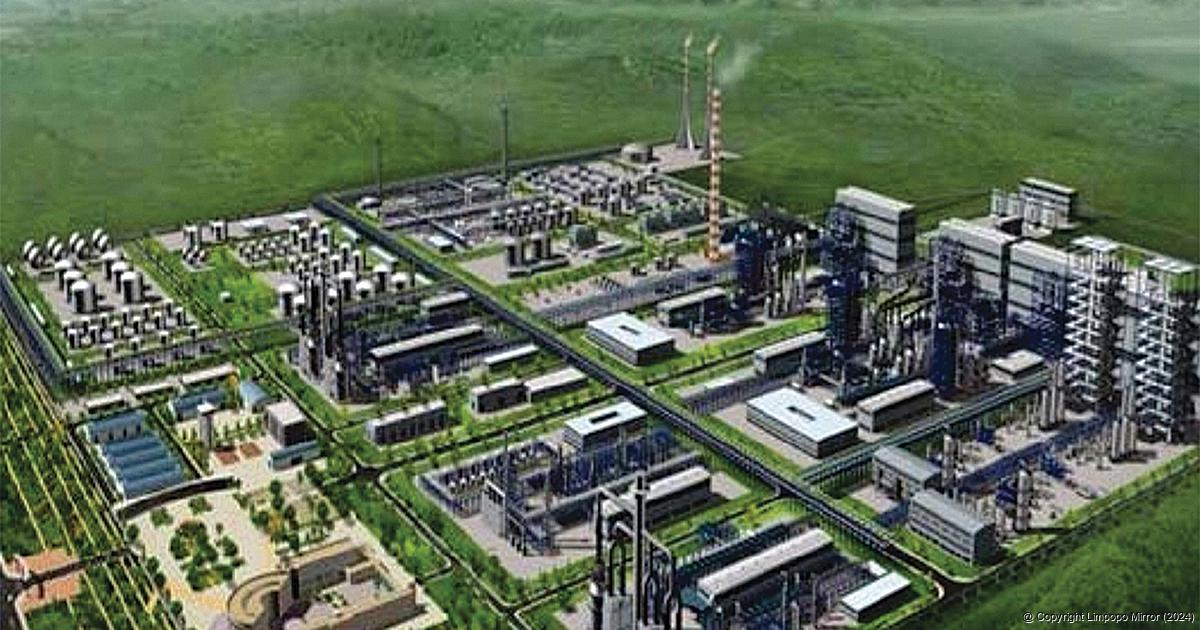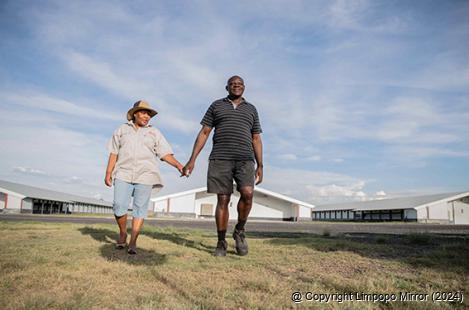

ADVERTISEMENT:

An artist’s impression of the proposed MMSEZ which, according to the MMSEZ CEO Lehlogonolo Masoga, will start taking shape within the next few months. Image supplied.
MMSEZ now also looking at nuclear power
Environmental groups reacted this week to the news that the proponents of the Musina-Makhado Special Economic Zone (MMSEZ) are now looking at nuclear power to fuel this controversial development.
This was according to a Moneyweb.co.za article published on 12 April (Limpopo SEZ wants to be the first in SA to go nuclear), which states that the MMSEZ developers are looking to acquire eight small modular reactors to supply nuclear power to the MMSEZ. In the same article, the CEO of the SEZ, Mr Lehlogonolo Masoga, is quoted as saying that the MMSEZ is in the final stages of planning, with the roll-out of bulk infrastructure, roads, and water to begin within the next few months.
“It is frankly absurd”
“Our response to this latest announcement is that it is frankly absurd – perhaps not as absurd as the ‘green’ coal-to-hydrogen scheme announced in 2022, but certainly more absurd than the solar power generation schemes, the latest of which is the Red Rocket deal announced after the Mining Indaba earlier this year, all of which require bulldozing of thousands of acres of Mopane Bushveld vegetation on a sensitive site – and still won’t prove adequate to the task of meeting the power needs of the hyper energy-intensive metallurgical industry on the scale planned,” said Ms Lauren Liebenberg of the Living Limpopo environmental group, adding that this was according to their own specialist energy-impact assessment undertaken for the environmental impact assessment (EIA).
“They have no consistent plan”
“It is obvious that the MMSEZ managers/planners have no consistent plan for bulk electricity provision nor water provision for the MMSEZ, since they have moved from coal power to solar power and now to nuclear power! Clearly, they have been in touch with the Department of Economic Affairs and Gwede Mantashe's office, who are trying to push the nuclear agenda once again,” said Mr Johan Fourie of Save Our Limpopo Valley Environment (SOLVE).
For Ms Makoma Lekalakala of Earthlife Africa, this latest announcement is neither positive nor negative. “An EIA will have to be conducted, and based on the cost and waste management, this will not be possible. All forms of energy have been suggested for the MMSEZ, including ‘clean coal,’ which is also neither here nor there,” Lekalakala told the Zoutpansberger.
Liebenberg said that they would oppose any attempt to apply for nuclear reactors at the MMSEZ site. “Should the MMSEZ SOC apply for environmental authorisation for a nuclear power project, we would certainly oppose it on the same grounds that their own energy specialist rejected it: It isn’t viable. Since their modular reactors will still fail to meet this critical dependency for the project – adequate power supply – it would merely enable this ‘huge white elephant’ in the making,” said Liebenberg. She said they still saw no economic rationale for a steel-manufacturing megaproject in Vhembe that would more than double SA’s annual crude-steel output, while the local steel industry is on its hands and knees and beset with huge over-capacity. “No power solution for the MMSEZ’s steel smelter will receive our support, in any event, especially when the development of heavy industry and extensive open-cast coal mining (that it will drive) will also come at the cost of the Great Vhembe Conservation Area project and the nature-based economic development plan for which we advocate,” said Liebenberg.
Environmental groups will fight
“I believe the fight against nuclear power is not new and we will have a lot of support from communities and NGOs across SA, who will assist us in fighting against a nuclear power plant. We also have Makoma Lekalakala on our team, who has successfully prevented the government from proceeding with their nuclear power plants in other parts of the country and her experience and input will be of great value,” said Fourie. He said his honest opinion was that this was just another pipe dream and wishful thinking on the part of the MMSEZ SOC that would not materialise in his lifetime. Adding to this, Liebenberg said, the regulatory approvals process through the National Nuclear Regulator of South Africa alone would likely take at least five years. “We are having a panic attack!” she said.
As for Masoga’s reference to the roll-out of bulk infrastructure, Lekalakala and Fourie were very doubtful. According to Lekalakala, it all depends on which site they are referring to. “Also, has there been any licensing acquired for some of the bulk services they are referring to?” Lekalakala wanted to know.
“We know it is election year”
“We know it is election year and announcements like these are merely part of the electioneering campaign - making empty promises!” was Fourie’s response to the infrastructure roll-out announcement. “Just a reminder that Coal of Africa/MC Mining has promised people a coal mine since 2007 and it is 17 years later now and the Makhado Colliery is still not there! The MMSEZ is just another example of a proposed development that will most likely follow the same route,” said Fourie. He stated that at this point, they had not even obtained a water-use license for the MMSEZ and the application for a water-use license seemed to have started from scratch. “No water, no MMSEZ! We are currently engaged as part of larger groupings in various court actions against the MMSEZ, and in our view, illegal granting of environmental authorisation for the project. To talk about commencement of work on the project with legal actions pending is therefore premature,” said Fourie.
Water licence process “re-boot”
On the issue of water use, Liebenberg said environmental groups were apparently being forced to confront the MMSEZ’s claims on Limpopo’s water resources once more. This after receiving notice from Matukane Associates, appointed environmental assessment practitioners (EPA) for the MMSEZ, about the “re-boot” of the public-participation process (PPP) for a water-use licence application (WULA) for the water requirements of the MMSEZ’s phase 1 southern site (Mopani). This application is for the abstraction of groundwater from eight boreholes on the project site. The water will only be used for service-infrastructure development and associated support. The MMSEZ applied for the water-use licence to use the water for a period of five (5) years. The intention is not to use this water for industrial processing as other sources will be developed for this purpose in due time. The PPP will run from 12 April until 21 June this year and all interested and affected parties already registered will not need to register again.
“While this application may only be for the ‘phase 1’ groundwater abstraction on the site on the Mulambwane Community’s land, that will supposedly be succeeded by the ‘phase 2’ construction of the 1,000Mn3/a Musina Dam in the Limpopo River,” said Liebenberg. This dam is intended to capture up to 60% of the Limpopo’s annual flow to meet 90% of the 125Mn3/a needed per annum during the operating phase of the MMSEZ, augmented by 30Mn3/a from the Mutasshi Corridor scheme from the Zhove Dam on the Umzingwani River in Zimbabwe. Liebenberg said she was always mindful of the findings of two independent research reports conducted by Dr Victor Munnik on the impact the MMSEZ would have on the Limpopo region.
The reports were commissioned by the Friedrich Ebert Stiftung’s SA office, a social democratic foundation that aims to strengthen the forces of democracy and strive for a just, sustainable, democratic economic system. The first report was titled Water risk of fossil fuel mega projects in Limpopo: the MCWAP and the MMSEZ report published in May 2020. The second report was entitled Water Governance of the Northern Limpopo published in August 2022. The first research report found that: “In light of the lack of feasibility of the plans above, it is highly likely that current water users will be prejudiced if any of the EMSEZ plans are set in motion. This includes the ‘diffuse water users’, a large number of poor, rural and often female-headed households who use small amounts of groundwater, which can disappear, as it did in Mudimeli, with even small disturbances to a groundwater level.”
Date:19 April 2024
By: Andries van Zyl
Andries joined the Zoutpansberger and Limpopo Mirror in April 1993 as a darkroom assistant. Within a couple of months he moved over to the production side of the newspaper and eventually doubled as a reporter. In 1995 he left the newspaper group and travelled overseas for a couple of months. In 1996, Andries rejoined the Zoutpansberger as a reporter. In August 2002, he was appointed as News Editor of the Zoutpansberger, a position he holds until today.
Read: 7965

ADVERTISEMENT

ADVERTISEMENT:

Sponsored Content
McDonald’s yo rwela ṱari fulo ḽa ‘Know Our Food’
Vha McDonald’s fhano Afrika Tshipembe vho rwela ṱari fulo ḽavho ḽine ndi ḽau ḓivhadza vharengi vhavho nga ha vhuleme ha zwiḽiwa zwavho, nau ombedzela ha khamphani nga ha nḓila dzine vha dzudzanya ngayo zwiḽiwa zwavho vhatshiela vharengi.

ADVERTISEMENT:

Recent Articles
-

-

Damani Water Project upgraded and handed back to waterless residents
27 July 2024 By Silas Nduvheni -

Vhafaramikovhe vhatuku vhari vha ṱoḓa masheleni murahu nau vulwa ha VBS.
26 July 2024 By Elmon Tshikhudo -

Nga murahu ha minwaha ya sumbe, muḽoro wa Vendaboy Poet wo wedza.
26 July 2024 By Elmon Tshikhudo -

Vho Makhadi vho khethwa sa muthusamudzulatshidulo wa Sanef
26 July 2024 By Victor Mukwevho

ADVERTISEMENT

Popular Articles
-

Where do Limpopo's residents move to?
16 June 2024 By Anton van Zyl -

'Vampire' who attacks old lady killed by angry mob
07 June 2024 By Maanda Bele -

Univen student to represent SA in Germany
22 June 2024 By Thembi Siaga -

Light aircraft crashes at Masakona village
13 June 2024 By Thembi Siaga -

Dr Tryphina explores how indigenous plants can help cure “u wela”.
15 June 2024 By Maanda Bele -

When men are together, great ideas emerge
08 June 2024 By Elmon Tshikhudo -

No, the “foreigners” are not suffocating us in Vhembe.
16 June 2024 By Anton van Zyl


